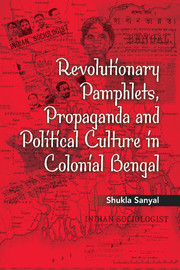Book contents
- Frontmatter
- Contents
- Preface
- Abbreviations and Glossary
- Introduction
- Chapter 1 The Origins of an Idea, 1905–18
- Chapter 2 The Signs of the Times: Constructing a Nation
- Chapter 3 Legitimizing Violence
- Chapter 4 The Battle for Domination: State Repression of Revolutionary Pamphlets
- Chapter 5 Summing Up: An Identity Forged in Battle
- Conclusion
- Bibliography
- Index
Chapter 3 - Legitimizing Violence
Published online by Cambridge University Press: 05 November 2014
- Frontmatter
- Contents
- Preface
- Abbreviations and Glossary
- Introduction
- Chapter 1 The Origins of an Idea, 1905–18
- Chapter 2 The Signs of the Times: Constructing a Nation
- Chapter 3 Legitimizing Violence
- Chapter 4 The Battle for Domination: State Repression of Revolutionary Pamphlets
- Chapter 5 Summing Up: An Identity Forged in Battle
- Conclusion
- Bibliography
- Index
Summary
At the core of the propaganda campaigns of the revolutionary pamphleteers lay the problematic category of violence. The idea of violence occupies a peculiarly ambiguous place within any political culture. Violence is typically defined as the illegitimate use of force or coercion to make others submit to one's will. Violence is a universal phenomenon, yet an understanding of what constitutes violence or an illegitimate or unfair use of force is a matter of subjective perception. As has been pointed out, acts of violence usually involve three parties, the perpetrators, the victims and the witnesses, yet violence is ‘very much a word of those who witness, or who are victims of certain acts, rather than of those who perform them.’ While victims protest the violence, the perpetrators, on the other hand, are convinced of the legitimacy of their cause and seek to persuade public opinion (witnesses) of the acceptability of their acts. They do so by appealing to certain cultural norms and values that provide their acts with meaning and supposedly justify their cause. Victims and perpetrators can both appeal to cultural values and social norms to justify their conflicting opinions of situations and actions and argue that rightness and justice lie with their respective interpretations. To the extent that they are able to persuade public opinion to side with their perspective on the situation, they may claim victory for their cause.
- Type
- Chapter
- Information
- Publisher: Cambridge University PressPrint publication year: 2014



